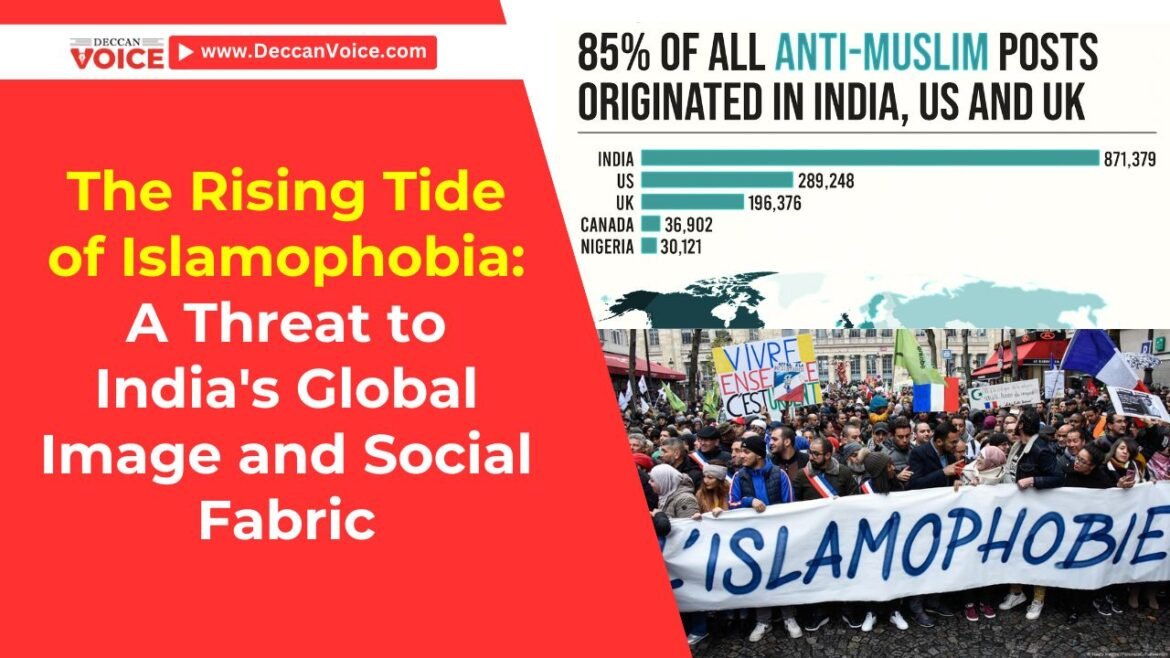Table of Contents
Islamophobia, defined as prejudice, discrimination, or hatred directed against Muslims, has emerged as a grave global concern. Disturbing data reveals a significant portion of this online hatred originates from a few key countries, with India regrettably at the forefront. This alarming trend not only jeopardizes the nation’s internal social cohesion but also poses a direct threat to India’s international standing and its diplomatic relations, particularly with Arab and Muslim-majority nations.
India’s Disproportionate Contribution to Online Islamophobia
According to data from recent analyses, a striking 85% of all anti-Muslim posts globally originate from just three countries: India, the United States, and the United Kingdom. The figures are particularly concerning for India, which accounts for the largest share with 871,379 anti-Muslim posts. The US follows with 289,248, and the UK with 196,376, with Canada and Nigeria also contributing. This overwhelming proportion from India indicates a serious issue of proliferating online hate.
The Alleged Perpetrators: Anti-Social Elements and Hindutva Ideologues
Critics and observers point fingers at certain “anti-social elements” and individuals with a “Hindutva mindset” as primary drivers behind this spread of Islamophobia. These groups are accused of actively disseminating hateful news and posts, often driven by an ideological agenda to create divisions and foster animosity towards the Muslim community. This deliberate propagation of negative stereotypes and misinformation is seen as a calculated effort to polarize society.
The Role of Media and Cinema in Amplifying Hate
A significant concern is the alleged complicity of certain sections of the Indian media, often termed “Godi Media” by critics, for acting as enablers in this campaign of hate. These media outlets are accused of providing platforms for individuals and groups to air anti-Muslim views, amplify divisive rhetoric, and selectively report or sensationalize incidents in a manner that fuels Islamophobia. By promoting such narratives, they inadvertently legitimize and normalize prejudice in the public discourse.
Furthermore, this ideological agenda is now reportedly making inroads into Indian cinema. Allegations suggest that “anti-social elements” are investing in movies to promote their Hindutva agenda and Islamophobic views. Films like “The Kashmir Files,” and upcoming projects like “Hari Hara Veera Mallu” (which critics fear might also contribute to this trend), have drawn sharp criticism for what some perceive as a biased portrayal of Muslim characters or historical events designed to malign the community.
A Destructive Impact on India’s Global Image
The unchecked spread of Islamophobia, particularly its digital footprint originating from India, carries severe consequences for the nation’s global reputation. Despite Prime Minister Narendra Modi’s concerted efforts to forge strong diplomatic and economic ties with Arab and Muslim countries, these internal dynamics risk undermining such initiatives. If the perception of “India as anti-Muslim” gains traction globally, it could lead to strained international relations, economic repercussions, and a tarnished image on the world stage. It contradicts the secular and pluralistic values enshrined in the Indian constitution.
A Call for Strict Action
It is imperative for the Indian government to take decisive and strict actions against individuals and groups found to be spreading hate against any religious community. The unchecked proliferation of Islamophobic content, whether online, through media, or via cinematic portrayals, poses a direct threat to India’s internal peace and its standing as a diverse, democratic nation. Ensuring religious harmony and curbing hate speech is not merely a moral obligation but a strategic necessity for India’s future prosperity and global respect.



